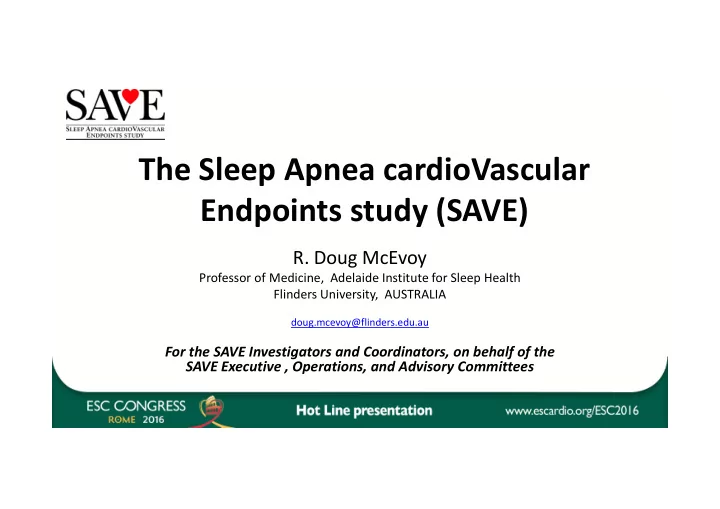

The Sleep Apnea cardioVascular Endpoints study (SAVE) R. Doug McEvoy R. Doug McEvoy Professor of Medicine, Adelaide Institute for Sleep Health Flinders University, AUSTRALIA doug.mcevoy@flinders.edu.au For the SAVE Investigators and Coordinators, on behalf of the SAVE Executive , Operations, and Advisory Committees
Disclosures • Personal disclosure: Research funding - Philips Respironics, AirLiquide, ResMed and National Health and Medical Research Council (NHMRC) of Australia • Main funding for SAVE - Philips Respironics and NHMRC • Main funding for SAVE - Philips Respironics and NHMRC Additional support - ResMed, Fisher&Paykel, Australasian Sleep Trials • Network, Spanish Respiratory Society, and Fondo de Investigaciones Sanitarias
Why did we do the study? Obstructive sleep apnea (OSA) affects 40-60% of patients with • CV disease OSA associated with • – elevated BP, insulin resistance and endothelial (blood vessel) dysfunction, – elevated BP, insulin resistance and endothelial (blood vessel) dysfunction, and – increased CV morbidity and mortality RCT data lacking regarding the benefit of OSA treatment for CVD • prevention
• STUDY AIM – To determine if CPAP treatment of moderate to severe OSA in patients with CV disease would reduce the incidence of future CV events • STUDY DESIGN – Multinational, open-label Randomized Controlled Trial – Multinational, open-label Randomized Controlled Trial • CPAP +Usual Care versus Usual Care alone • Primary endpoint – composite of cardiovascular death, MI, stroke, hospitalization for TIA, unstable angina or HF – 2717 pts, 7 countries, followed for av. 3.7 years
Who did we study? Patients Excluded those with • Severe sleepiness/ risk of fall- • Aged 45-75 years, with asleep accident • Coronary or cerebrovascular • Very severe oxygen deprivation • Very severe oxygen deprivation disease, and disease, and • Advanced Heart Failure • Moderate-severe OSA, who • Central sleep apnea (Cheyne Stokes respiration) could • Prior CPAP use • Use a CPAP mask >3 h/night
What did we find? � No effect of CPAP treatment on Primary (or secondary) CV endpoints � Trend toward reduction in cerebrovascular events in patients who used CPAP >4 hours per night � CPAP improved patient well-being � CPAP improved patient well-being � Less snoring, less daytime sleepiness � Less depressed � Improved QoL � Fewer work days lost due to ill-health
McEvoy RD et al. NEJM 2016, 28 August [Epub ahead of print].
Recommend
More recommend